大学英语语法与写作College English Grammar and Writing 10 Phrases Gerund Phrases and Absolute Phrases
大学英语作文关于英语语法令我头疼

大学英语作文关于英语语法令我头疼全文共3篇示例,供读者参考篇1College English Composition: English Grammar Makes My HeadacheLearning English grammar has always been a challenging part for many college students, including myself. It's not only because English grammar rules are intricate and complex, but also because there are so many exceptions that make it difficult to remember. This is why I often find myself scratching my head in frustration whenever I come across a grammar question in my assignments or exams.One of the biggest headaches for me is the proper use of tenses. English has twelve tenses, and each tense has its own rules and usage. Sometimes it's hard to determine which tense to use in a particular situation, especially when the context is not clear. This often leads to confusion and errors in my writing.Another grammar issue that I struggle with is the use of articles. In English, there are two types of articles: indefinite (a, an) and definite (the). Knowing when to use each type of article canbe a challenge, especially when dealing with countable and uncountable nouns. I often find myself unsure whether to use "a" or "an" before a word, which can affect the overall clarity of my writing.Subject-verb agreement is another aspect of English grammar that gives me headaches. It's essential to ensure that the subject and verb in a sentence agree in number and person. However, sometimes I find it hard to determine whether to use a singular or plural verb, especially when dealing with compound subjects or tricky sentence structures.Punctuation is another aspect of English grammar that often confuses me. Knowing when to use commas, semicolons, colons, and dashes can be challenging, and improper punctuation can change the meaning of a sentence entirely. This is why I always have to double-check my punctuation while writing to ensure clarity and correctness.Despite these challenges, I understand the importance of mastering English grammar. Good grammar skills not only help improve communication but also enhance writing fluency and coherence. Therefore, I try to overcome my grammar struggles by seeking help from my instructors, using grammar resources, and practicing regularly. I believe that with time and effort, I willbe able to conquer my difficulties with English grammar and become a better writer and communicator.篇2College English Essay: English Grammar Gives Me a HeadacheEnglish grammar is a fundamental aspect of the English language, and as a college student studying English, I have come to learn that mastering grammar is crucial for effective communication and writing. However, I must admit that English grammar often gives me a headache. The rules, exceptions, and nuances of English grammar can be overwhelming and confusing at times. In this essay, I will discuss some of the challenges I face with English grammar and share strategies that have helped me overcome them.One of the main challenges I encounter with English grammar is the sheer number of rules and exceptions to those rules. For example, the rules regarding subject-verb agreement, verb tenses, and pronoun usage can be difficult to remember and apply correctly. Additionally, English has many irregular verbs, plurals, and pronouns that do not follow standard patterns, making it even more confusing for non-native speakers like me.Another aspect of English grammar that I find challenging is understanding the nuances of the language. English has many subtle rules and conventions that native speakers intuitively understand but are not always explicitly taught in grammar books. For example, knowing when to use articles (a/an/the) or prepositions (in/on/at) can be tricky for non-native speakers, as the usage often depends on context and idiomatic expressions.Moreover, the syntax and sentence structure of English can be complex and varied, requiring a deep understanding of grammar rules to construct coherent and grammatically correct sentences. For example, the use of passive voice, relative clauses, and conditional sentences can be confusing for non-native speakers, as they involve specific word order and verb forms that must be used correctly.Despite the challenges I face with English grammar, I have found several strategies that have helped me improve my grammar skills. Firstly, I make a conscious effort to practice grammar regularly by reading books, articles, and essays written in English. This exposure to written English helps me internalize grammar rules and patterns, making them easier to remember and apply in my own writing.Secondly, I rely on grammar resources such as textbooks, online grammar guides, and grammar-checking tools to clarify any doubts or questions I have about specific grammar rules. These resources provide clear explanations, examples, and exercises that help me reinforce my understanding of English grammar.Additionally, I actively seek feedback from my professors, tutors, and peers on my writing, as they can point out any grammar errors or mistakes that I may have overlooked. By receiving constructive criticism and guidance, I can learn from my mistakes and improve my grammar skills over time.In conclusion, English grammar can be a challenging aspect of language learning, but with dedication, practice, and the right resources, it is possible to overcome these challenges and become proficient in English grammar. As a college student studying English, I continue to work on improving my grammar skills and expanding my knowledge of the language. While English grammar may give me a headache at times, I am determined to master it and become a confident and competent English speaker and writer.篇3College English Essay: English Grammar Gives Me a HeadacheEnglish grammar is one of the most challenging aspects of learning the language for many students, myself included. The rules and exceptions can be confusing and overwhelming, making it difficult to express oneself accurately and proficiently. In this essay, I will delve into the reasons why English grammar gives me a headache and the strategies I use to overcome these obstacles.To begin with, English grammar is notorious for its complex rules and exceptions. There are countless rules for verb tenses, sentence structure, punctuation, and more, all of which must be followed precisely to communicate effectively. Additionally, English is a language with many irregular verbs, pronouns, and spelling patterns, adding to the confusion and difficulty of mastering its grammar.Another reason why English grammar is so challenging is the lack of consistency in the language. Unlike some languages with straightforward rules and patterns, English grammar often defies logic and can be unpredictable. For example, irregular plurals, verb conjugations, and sentence constructions can vary wildly and make it challenging to memorize and apply consistently.Furthermore, English grammar can be intimidating due to the pressure of communicating accurately and effectively. As a student, I often feel self-conscious about making mistakes in my writing and speaking, knowing that grammar errors can detract from my message and credibility. This fear of judgment and criticism can create a mental block that impedes my ability to communicate confidently and fluently in English.Despite these challenges, I have found several strategies to help me navigate the complexities of English grammar more effectively. Firstly, I actively engage in grammar practice and exercises to reinforce my understanding of key concepts and rules. By practicing regularly, I can internalize the rules and patterns of English grammar, making it easier to apply them in my writing and speaking.Secondly, I seek feedback from professors, tutors, and peers to identify areas of improvement in my grammar skills. Constructive criticism and guidance from others allow me to pinpoint my weaknesses and address them proactively, leading to gradual improvement and development in my grammar proficiency.Lastly, I strive to approach English grammar with a positive and curious mindset, embracing mistakes as opportunities forgrowth and learning. By viewing grammar challenges as stepping stones rather than stumbling blocks, I can cultivate resilience and perseverance in my language learning journey.In conclusion, English grammar can be a formidable adversary for many students, presenting a myriad of rules, exceptions, and inconsistencies that can be overwhelming. However, with dedication, practice, and a positive attitude, it is possible to overcome these challenges and enhance one's proficiency in English grammar. By adopting effective strategies and seeking support from others, I have learned to navigate the intricacies of English grammar and improve my communication skills gradually. Ultimately, mastering English grammar is a rewarding and empowering achievement that opens doors to greater opportunities and success in both academic and professional settings.。
关于英语语法令我头疼的大学英语作文
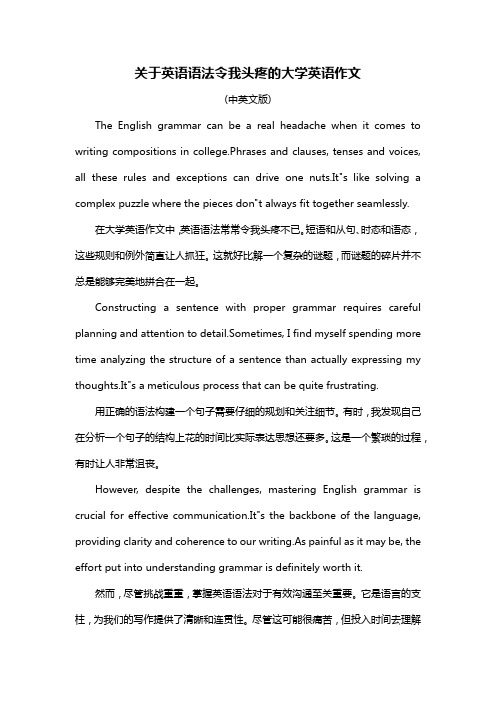
关于英语语法令我头疼的大学英语作文(中英文版)The English grammar can be a real headache when it comes to writing compositions in college.Phrases and clauses, tenses and voices, all these rules and exceptions can drive one nuts.It"s like solving a complex puzzle where the pieces don"t always fit together seamlessly.在大学英语作文中,英语语法常常令我头疼不已。
短语和从句、时态和语态,这些规则和例外简直让人抓狂。
这就好比解一个复杂的谜题,而谜题的碎片并不总是能够完美地拼合在一起。
Constructing a sentence with proper grammar requires careful planning and attention to detail.Sometimes, I find myself spending more time analyzing the structure of a sentence than actually expressing my thoughts.It"s a meticulous process that can be quite frustrating.用正确的语法构建一个句子需要仔细的规划和关注细节。
有时,我发现自己在分析一个句子的结构上花的时间比实际表达思想还要多。
这是一个繁琐的过程,有时让人非常沮丧。
However, despite the challenges, mastering English grammar is crucial for effective communication.It"s the backbone of the language, providing clarity and coherence to our writing.As painful as it may be, the effort put into understanding grammar is definitely worth it.然而,尽管挑战重重,掌握英语语法对于有效沟通至关重要。
大学英语语法6——连接词省名师优质课赛课获奖课件市赛课一等奖课件
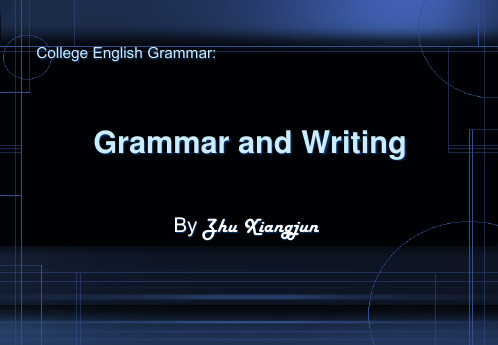
Grammar and Writing
By Zhu Xiangjun
Unit 6
Modifiers:Conjunctions
• Grammar: Conjunctions • Writing:
Correcting: Antecedent Problems Rewriting: How to combine into compound sentences
The possible meanings of conjunctive adverbs number six. 1. Time: afterwards, then, finally, eventually, later 2. Addition: also, furthermore, moreover, besides, in addition 3. Cause: as a result, accordingly, consequently, hence,
• Heavy rain would wash away the soil.
• Heavy rain would cause serious floods as well.
• Heavy rain would not only wash away the soil but also cause serious floods as well.
paint on one of the hands and slowed the clock down.
4. Conjunctive adverbs Conjunctive adverbs are used to clarify the relationship
大学英语语法7——介词短语
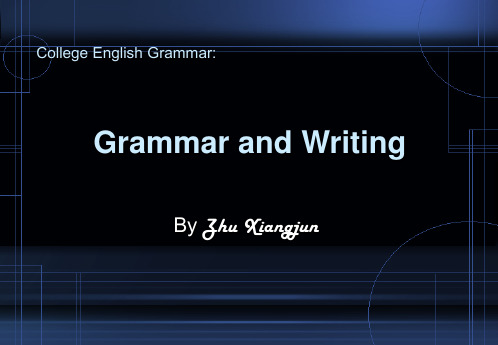
• “Coming!" Away she skimmed over the lawn, up the path, up the steps, across the veranda, and into the porch.
1. Form A prepositional phrase=a preposition+(adjectives)+a noun/pronoun
• I often consulted the adviser. • During my study period, I often consulted the adviser about
my selective courses.
2. Functions Prepositional phrases have three formal functions in sentences. They can act as an adjective modifying a noun, as an adverb modifying a verb, or as a nominal when used in conjunction with the verb form to be.
大学英语语法1——主语谓语(1)教学文案
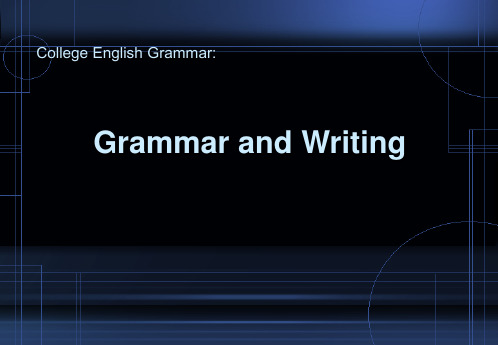
• Some of the buried workers are still alive.
• The babies grew nervous from the loud noise.
A verb is often made up of more than one word. The verb that expresses the action or state of being of the subject is called main verb. The word that accompany the main verb is called an auxiliary/ helping verb, which helps the main verb express mood or time by forming various tenses.
• In my garage, there is an old car. _______________. It is a Cadillac, a very classical luxury car, manufactured in 1966. The car has 65.000 original miles on it, but sitting in a damp garage for most of its life didn’t do many favors for it.
College English Grammar:
Grammar and Writing
Unit 1
Basic parts of a sentence (I)
• Grammar: 1. Subject and predicate 2.Hard-to-find subjects
英语语法让我很头疼大学英语作文
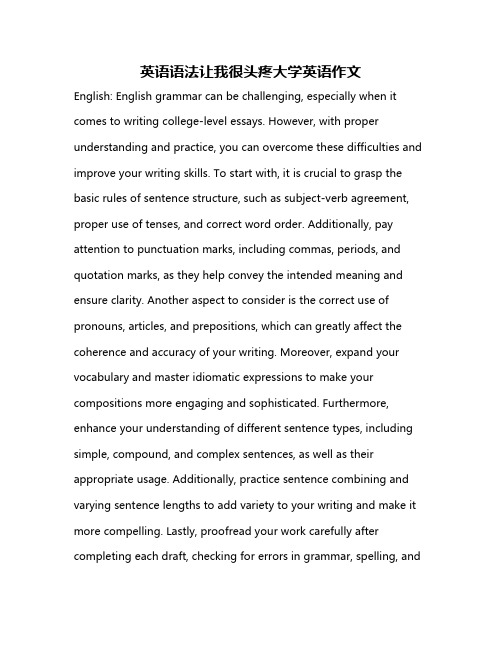
英语语法让我很头疼大学英语作文English: English grammar can be challenging, especially when it comes to writing college-level essays. However, with proper understanding and practice, you can overcome these difficulties and improve your writing skills. To start with, it is crucial to grasp the basic rules of sentence structure, such as subject-verb agreement, proper use of tenses, and correct word order. Additionally, pay attention to punctuation marks, including commas, periods, and quotation marks, as they help convey the intended meaning and ensure clarity. Another aspect to consider is the correct use of pronouns, articles, and prepositions, which can greatly affect the coherence and accuracy of your writing. Moreover, expand your vocabulary and master idiomatic expressions to make your compositions more engaging and sophisticated. Furthermore, enhance your understanding of different sentence types, including simple, compound, and complex sentences, as well as their appropriate usage. Additionally, practice sentence combining and varying sentence lengths to add variety to your writing and make it more compelling. Lastly, proofread your work carefully after completing each draft, checking for errors in grammar, spelling, andpunctuation. This will help you eliminate mistakes and enhance the overall quality of your essays. By following these tips and consistently practicing, you can gradually improve your command of English grammar and become a more confident and proficient writer.中文翻译: 英语语法可以让人感到头疼,尤其是在撰写大学级别的英语作文时。
关于英语语法的重要性的英语作文大学
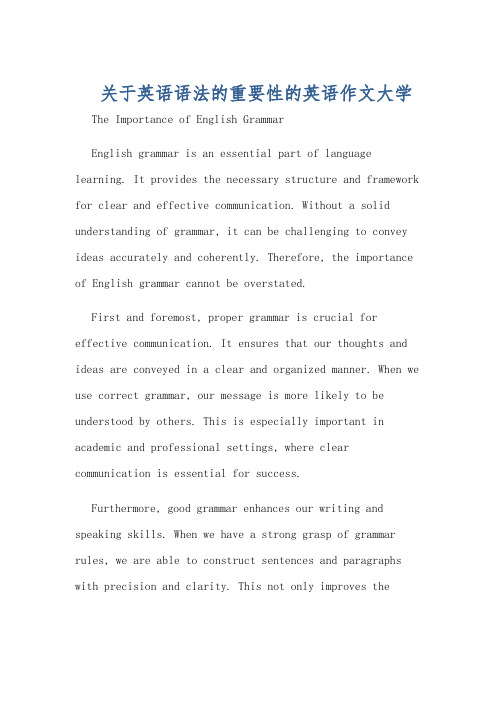
关于英语语法的重要性的英语作文大学The Importance of English GrammarEnglish grammar is an essential part of language learning. It provides the necessary structure and framework for clear and effective communication. Without a solid understanding of grammar, it can be challenging to convey ideas accurately and coherently. Therefore, the importance of English grammar cannot be overstated.First and foremost, proper grammar is crucial for effective communication. It ensures that our thoughts and ideas are conveyed in a clear and organized manner. When we use correct grammar, our message is more likely to be understood by others. This is especially important in academic and professional settings, where clear communication is essential for success.Furthermore, good grammar enhances our writing and speaking skills. When we have a strong grasp of grammar rules, we are able to construct sentences and paragraphs with precision and clarity. This not only improves thequality of our writing, but also makes us more effective communicators in verbal conversations.In addition, understanding English grammar is essential for language proficiency and fluency. A solid foundation in grammar allows us to express ourselves accurately and confidently. It enables us to use a wide range of vocabulary and sentence structures, making our language more dynamic and expressive.Moreover, knowledge of grammar is essential for academic and professional success. In educational settings, students are expected to write essays, reports, and research papers with proper grammar and punctuation. In the professional world, effective communication is key to success, and good grammar is a fundamental aspect of this.In conclusion, English grammar is of paramount importance for effective communication, language proficiency, and academic and professional success. It provides the necessary structure and framework for clear and coherent expression. Therefore, it is essential for language learners to prioritize the study and practice of grammar in their language learning journey.英语语法的重要性英语语法是语言学习的重要组成部分。
英语语法对我来说很头疼的大学英语作文

英语语法对我来说很头疼的大学英语作文English Grammar is Really Hard for MeHi, my name is Tommy and I'm in 5th grade. I have to write this essay for my college English class about how grammar is super difficult for me. I don't really know much about essays or college, but here goes!First of all, English just has way too many rules about grammar. Why can't everyone just speak however they want without all these made-up rules? In math class, 2+2 will always equal 4 no matter what. But in English, there are exceptions to every single rule which makes no sense to me.Like why do we have to put 's' at the end of words to make them plural, but then words like 'sheep' and 'deer' stay the same in both singular and plural form? Whose idea was that? And why do we say "go" but then the past tense is "went" instead of "goed"? Pointing out all the irregular verbs is going to take me a really long time.And let's not even get started on subjects and objects and when to use 'who' versus 'whom.' I can never remember which one is supposed to be used as the subject or object. I always mix them up. "Who opened the door?" or "The door was opened bywhom?" I have no idea! Just let me say "Who opened the door?" and "Who did the door get opened by?" and we'll all know what I'm talking about.Then there are these things called articles, like 'a,' 'an,' and 'the.' Why do we even need them? "I ate an apple" versus "I ate apple" means the same dang thing! And don't even get me started on the 24 different tenses in English. Past, present, future, present perfect, past perfect, future perfect, and a million other ones I can't keep straight. Why can't we just say what we want to say and be done with it?Spelling is another nightmare I have to deal with. Why is "night" spelled with a 'gh' but we don't pronounce the 'gh'? Totally makes no sense. And words like "ough" can be pronounced like 8 different ways: "though", "through", "thought", "plough", "hiccough", "dough", "enough". How is anyone supposed to keep track of that? English needs a total spelling makes-sense makeover.Grammar is also super boring. Reading grammar books makes my eyes glaze over. Why can't we just learn this stuff by watching fun movies or listening to cool music instead of staring at paperbacks full of terminology and rules I'll never use againafter this class? "Identify the antecedent to the pronoun in this perfectly bland sample sentence." No thanks!What also makes no sense are phrases like "You can't have your cake and eat it too." I for sure want to have my cake AND eat it. That's the whole point of cake! Or sayings like "Don't count your chickens before they hatch." Well duh, I'm counting the baby chicks, not the eggs! These stupid English idioms and expressions are so confusing and make no logical sense.Probably the worst part though is trying to learn proper English writing structure. You know, with topic sentences, body paragraphs, transition sentences, conclusions, and all that tedious formatting. Who even writes like that besides English teachers? I just want to freely ramble on about what's on my mind without having to organize it in any particular way. Grammar rules are chopping my creative thoughts into structured boxes and it's not fair!So in summary, English grammar is my nemesis. Too many endless rules, exceptions to rules, weird spellings, tenses, parts of speech, and other crazy stuff I have to try to memorize. Does anyone actually speak following all these rules in real life? I don't think so! People should just talk however they want and English teachers should stop torturing kids with all these grammarguidelines. That's what I think and you can't make me learn grammar if I don't want to! The end.。
- 1、下载文档前请自行甄别文档内容的完整性,平台不提供额外的编辑、内容补充、找答案等附加服务。
- 2、"仅部分预览"的文档,不可在线预览部分如存在完整性等问题,可反馈申请退款(可完整预览的文档不适用该条件!)。
- 3、如文档侵犯您的权益,请联系客服反馈,我们会尽快为您处理(人工客服工作时间:9:00-18:30)。
2) as a noun to be predictive • He finishes his supper. • He takes a short walk. • That is his habit. • In this habit, he keeps healthy. • His habit to keep healthy is taking a short walk after supper. 3) as a noun to be appositive • His dream is finding lost treasure. • His dream almost came true recently. • His dream, finding lost treasure, almost came true recently.
5. He wanted to follow me around all morning. I had to think of a way. By the way I can prevent him from that.
I had to think of a way of preventing him from following me around all morning.
• Nobody was at home. • The thief took a lot of things away. • Nobody (being) at home, the thief took a lot of things away.
II.2. Function • An absolute phrase functions as an adverb, indicating manner,
I. Gerund Phrases
Both a gerund and a present participle end in –ing but they function as different parts of speech. A gerund is used as a noun, whereas a present participle is used as an adjective or an adverb.
3) When the action happened in the past, a gerund is usually used.
• She has had quick thinking. • That saved us all a lot of trouble. • Her quick thinking saved us all a lot of trouble.
• Living a happy life is everyone’s deepest desire. • (normal subject, more natural) • To live a happy life is everyone’s deepest dcommon)
nutrients.
• we waiting in line • the students holding a
meeting • the ruler broken • the train crowded • the climate (being) mild • the soil (being) rich in
6. I tried to wake up my wife. I rang the doorbell. She was fast asleep.
I tried to wake up my wife by ringing the doorbell, but she was fast asleep.
I.1. Form and function • A gerund phrase includes the gerund and the object of the
gerund or any modifiers related to the gerund. Like a gerund, it is used as a noun—as subject, predictive, object, object of a preposition, or appositive.
4) The following is a list of verbs that can have gerund objects, but not infinitives
• admit, anticipate, appreciate, avoid, complete, consider, • defend, delay, deny, detest, discuss, dislike, • enjoy, escape, excuse, finish, • get through, give up, go on, can't help, • imagine, involve, keep (on), would like (him), • mention, (not) mind, miss, • postpone, practice, put off, quit, • recall, recollect, recommend, report, resent, resist, resume,
time, place, cause, condition, or degree . It modifies the whole sentence rather than a particular word. All absolute phrases can be turned into correspondent adverbial clauses. • The wings were damaged by the storm. • The aircraft crashed. • Its wings damaged by the storm, the aircraft crashed. • (Or: Because its wings were damaged by the storm, the aircraft crashed.) • The weather permits. • We will have the picnic tomorrow. • Weather permitting, we will have the picnic tomorrow. • (Or: If the weather permits, we will have the picnic tomorrow.)
risk, • (can't) see, stop, suggest, take up, tolerate, understand
4. The woman simply took the parcel. She walked out of the shop. She didn’t pay.
The woman simply took the parcel and walked out of the shop without paying.
II.3. Position and punctuation
As an absolute phrase acts as an adverb, its position in a sentence is very flexible. As sentence opener or subject-verb split, an absolute phrase usually expresses cause, time, condition, or purpose. As sentence closer, it shows effect or adds more detail or focus to the idea of the main clause, particularly when the absolute refers to an event that occurs later than the event in the main clause.
4) as a noun to be object • I travel in the country. • I love that. • I lose my way. • I don’t like that. I love traveling in the country, but I don't like losing my way. 5) as a noun to be object of a preposition • They wanted to travel to foreign country. • They have made preparation for it. They have made preparation for traveling to a foreign country.
College English Grammar:
Grammar and Writing
Unit 10
Phrases: Gerund Phrases and Absolute Phrases
• Grammar: 1. Gerund Phrases 2. Absolute Phrases
• Writing: Correcting: Missing Commas with Nonessential Elements Rewriting: Intra-sentence coherence
nutrients
